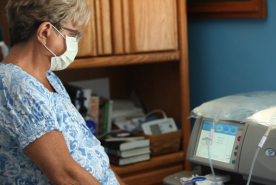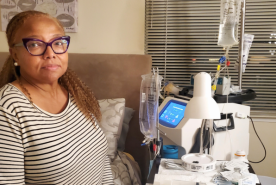Table of Contents
- Can I really stop dialysis treatment if I want to?
- If I ask to stop dialysis, how will the health care team at my unit respond?
- How do I discuss my decision with my family and friends?
- Can any changes be made in my treatment that might improve my quality of life?
- Will I be asked to speak to a mental health professional?
- Is stopping dialysis considered suicide?
- How long will I live if I choose to stop dialysis?
- What should I expect after stopping dialysis?
- What type of food and drink could I have?
- Will my renal health care team continue to help me?
- Can I get hospice care?
- Do I have a choice of where I die?
- If I choose to die at home, can I get a home health care worker to help my loved ones?
- Will I still be covered by Medicare and/or my private medical insurance if I stop treatment?
- If I change my mind, can I go back on dialysis? Will I feel sicker if I do?
- Can I name someone to make decisions for me if I am not able to act on my own behalf?
- What should I do if I decide to stop dialysis treatment?
There may come a time when you feel you want to discontinue dialysis treatment. You may feel that dialysis is no longer maintaining or improving your quality of life. If this occurs, it is important to know that you have the right to make the decision to stop dialysis. However, before making this decision, it is important that you discuss it carefully with your loved ones and treatment team.
Can I really stop dialysis treatment if I want to?
Yes, dialysis patients are allowed to make decisions about stopping dialysis treatment. You are encouraged to discuss your reasons for wanting to stop treatment with your doctor, other members of your health care team and your loved ones before making a final decision.
Check out our online communities to connect, learn more and hear from others going through similar experiences.
NKF Dialysis Community

Fistula covering
Hallo everyone, Since I get my fistule on the hand I started to wear longsleeve shirts. It draw attention and people asking me "what is it?" very often, so I decided to hide it. But summer comes soon and wearing longsleeves would be incomfortable. Do you guys covering your fistula or not?

My Brother is refusing dialysis treatments
We are trying to get Our Brother to continue his dialysis treatments. He has missed six treatments and is very weak. This is very frustrating, because he refusing treatments.

Hello I'm new , my partner has end stage 4 CKD I'm from nz wellington
Hi there , I really hate this disease , I have seen how it can just destroy people. their minds too! having no energy and feeling washed out. My partner is going to need Dialysis soon his efgr is 20 at the moment but rapidly declining every fortnight , 1 point down each fortnight. He had prostate cancer and had Zoladex and radiation which I believ

Solo home hemodialysis can be safe for patients and clinicians
April 07, 2025 Solo home hemodialysis can be safe for patients and clinicians Among the top three barriers to home dialysis, cited independently by both patients and clinicians, is the need for home-based support, according to data published in the American Journal of Kidney Disease in 2024. The most recent USRDS Annual Data Report shows 14.5%

Bionic Kidney "The Kidney Project" is nearing clinical trials....Let's all support this, it can change our lives
Hi Everyone, I have been a follower of the Kidney Project out of UCSF for the last 5-6 years. Dr Shuvo and his team are doing a fantastic job to bring this innovation to life. But as a non-profit they have only access to funds through fundraisers and donations. It pains me to say that this project is delayed going into the market by more than a y

How a Kidney Failure Diagnosis and Transplant Inspired a Future Doctor
After battling kidney failure and receiving a transplant, Andrew is determined to become a doctor and change lives. Read more: https://www.kidney.org/news-stories/how-kidney-failure-diagnosis-and-transplant-inspired-future-doctor

Long road
Yes I'm 36 and been on dialysis since u was 18 I live in Paducah Kentucky and it's been a rollercoaster of a ride. I started out young and. Didn't want to believe that lupus tooky kidneys away so I didn't got for a whole month during the summer months which was really bad I was so cold with the toxins in side of me I was wearing winter clothes when

advice
on my previous post i want to add that my partner is dizzy and breathless this is all happening so quickly does this sound like hes going to stage 5?

Anyone here on Peritoneal dialysis (PD) with Parkinson's (PD)?
Hi, I am 75 years old, have CKD and my nephrologist is recommending PD dialysis for me. I'm at the point where it's going to be needed in the future because my kidneys are getting worse but I don't need it right this minute. I also have Parkinson's and that along with carbidopa/levodopa type medication causes slow intestinal motility, constipation

LIVING WITH DIALYSIS-NEED ADVICE
As I stated in previous posts, my husband 74 has been on dialysis just over 1 year. In the last 2-3 months his legs have really gotten weaker. We first thought it was because of poor circulation, then he had an MRI of his lower back and they found a pinch nerve at L4=L5 plus spinal stenosis. but not bad enough for surgery. So we set up for him to g
If I ask to stop dialysis, how will the health care team at my unit respond?
The members of your health care team will want to have a clear understanding of why you made this decision (worsening health, specific treatment problems, depression) to determine if any improvements might be made that could affect your decision. Your doctor, social worker and nurse may all speak to you and encourage you to talk openly about your feelings.
How do I discuss my decision with my family and friends?
Many people find it difficult to talk to loved ones about stopping treatment, and they worry about how others will feel and react. Although you may find it hard at first, the best approach is to discuss your feelings openly with your loved ones. You may wish to have members of your health care team (like the doctor, primary care nurse or social worker) present when you speak with them.
Will I be asked to speak to a mental health professional?
You might. If your health care team is concerned that you want to stop dialysis for solely emotional reasons or because you are suffering depression, you may be asked to speak with a psychiatrist, social worker or other counseling professional. Depression may be treated successfully with counseling, medicine or a combination of both. The team may also want you to speak with a mental health professional to make sure you understand the full impact of what stopping dialysis will mean.
What should I expect after stopping dialysis?
Death from kidney failure is usually painless. However, if you do feel any discomfort, pain medicine may be prescribed for you. Without your dialysis treatment, toxic wastes and fluid will build up in your body, making you feel more tired. The fluid build-up can make it more difficult for you to breathe, but your doctor can prescribe diuretics or a treatment called ultrafiltration to remove fluid and make breathing easier for you. The doctor may also recommend that you limit your intake of salt and fluids to reduce fluid weight gain.
Dialysis
Sign up for a deep dive into dialysis
Learn about the different types of dialysis, receive additional resources, and learn so much more.
Will my renal health care team continue to help me?
Absolutely. Your team should remain available to you and your loved ones. Your doctor and primary nurse can advise you about the type of care you might need, and your social worker can help you arrange for care as well as provide emotional support to you and your loved ones.
Can I get hospice care?
Usually. If you choose to stop dialysis, you are considered to be in a terminal state and you are eligible for hospice care. The type of hospice care available may be either a home hospice program or a hospice facility. Your social worker can help you and your loved ones in making arrangements for hospice care.
Do I have a choice of where I die?
Your wishes about where you want to die will be honored as much as possible. Many people choose to die at home, where they feel more comfortable in familiar surroundings. If you choose this option, your social worker can assist you and your family in making any special arrangements for your care at home. A nursing home may be another option for some patients. A hospital admission is not always available, depending on the nature of your insurance coverage and your overall medical condition. Your health care team can help you decide if hospitalization is an option for you if you wish.
If I choose to die at home, can I get a home health care worker to help my loved ones?
The types of services covered at home will depend on your insurance. If you are in a home hospice program, a home health aide may be available to assist. If your insurance does not cover a home health aide and you and your loved ones wish to pay privately for these services, you can do so. Your social worker can usually assist in arranging these services.
Will I still be covered by Medicare and/or my private medical insurance if I stop treatment?
Your Medicare coverage will not end, even if you decide to stop dialysis. It is important that you and your family speak with your doctor about the type of care you will need. Once this is decided, you can check on whether your insurance will cover this care.
If I change my mind, can I go back on dialysis? Will I feel sicker if I do?
You may go back on dialysis if you change your mind. If you have missed several treatments, you may have some discomfort when you first start dialysis again. You should discuss the possibility of returning to dialysis with your doctor.
Can I name someone to make decisions for me if I am not able to act on my own behalf?
You can name someone (such as a spouse, adult child or close friend) to make medical decisions for you, such as stopping dialysis, in case you are no longer able to make these decisions for yourself. This is done by filling out a form called a health care proxy or a durable health care power of attorney. The person you name to make medical decisions for you is called a surrogate. It is important to make sure the person is willing to act on your behalf and that he or she knows your short- and long-term goals, values and what treatments you would or would not want to have if you were not able to speak for yourself. It is helpful if you complete a form called a treatment-specific living will, which will give your surrogate clear directions about your wishes regarding stopping dialysis and/or other medical treatments.
The role and responsibilities of the surrogate, as well as the types of decisions the surrogate may make, may vary from state to state, depending on the law of that state. Generally, the surrogate must follow your wishes. For more information about naming a surrogate and about the laws in your state, you may speak with an attorney or the social worker at your unit. To obtain copies of the forms used in your state, you may contact your local or state bar association or contact Choice in Dying, 1035 30th Street NW, Washington, DC 20007, (800) 989-WILL.
What should I do if I decide to stop dialysis treatment?
If you decide to stop dialysis treatment, you or your surrogate may want to make sure the following items are in order:
- Your will.
- Signed advance directive (living will, durable health care power of attorney or health care proxy) complying with your state law.
- A durable power of attorney, complying with your state law, naming someone to act on your behalf on all matters other than medical (e.g., legal, financial, banking and business matters). Your power of attorney must be a "durable" one in order to stay in effect even if you become unable to make your own decisions or if you die.
- An inventory, including the location of your bank, brokerage and other financial accounts, stock and bond holdings, real estate and business records, medical and other insurance policies, pension plans and other legal papers.
- Names, addresses and telephone numbers of your attorney, accountant, family members and other loved ones, friends and business associates who should be notified of your death or who may have information that will be helpful in dealing with estate affairs.
- A statement about your preference for funeral/memorial services, burial or cremation instructions and decisions about organ and tissue donation.
- Written or video- or audio-taped message to family members and other loved ones, business associates and friends.
Click here to access a PDF of this information.
If you would like more information, please contact us.
© 2015 National Kidney Foundation. All rights reserved. This material does not constitute medical advice. It is intended for informational purposes only. Please consult a physician for specific treatment recommendations.









